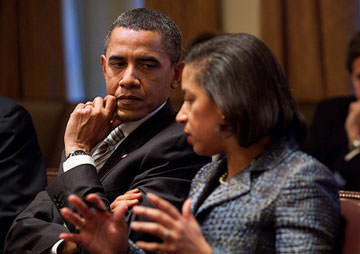Report Says Administration Wasn’t Lying About Benghazi
The bipartisan report on Benghazi released Wednesday by the Senate Intelligence Committee should finally convince conspiracy theorists of the obvious: There is no there there. President Barack Obama listens as Susan Rice, then the U.S. permanent representative to the United Nations, speaks during a meeting with U.N. ambassadors in the Cabinet Room of the White House in 2010. (Official White House Photo by Pete Souza)
President Barack Obama listens as Susan Rice, then the U.S. permanent representative to the United Nations, speaks during a meeting with U.N. ambassadors in the Cabinet Room of the White House in 2010. (Official White House Photo by Pete Souza)
The bipartisan report on Benghazi released Wednesday by the Senate Intelligence Committee should finally convince conspiracy theorists of the obvious: There is no there there.
Administration officials did not orchestrate any kind of attempt, politically motivated or otherwise, to deceive the American people. In their public statements, including the infamous talking points, they relied on what intelligence analysts told them.
In other words, if Susan Rice was wrong when she went on the Sunday talk shows and said the attacks were the violent outgrowth of a spontaneous anti-American demonstration rather than a long-planned terrorist assault, it was only because the intelligence community was wrong.
That said, the initial assessment given by Rice — then serving as ambassador to the United Nations, now as President Obama’s national security adviser — may turn out to have been correct. We don’t yet know. Says the report: “The IC [Intelligence Community] continues to review the amount and nature of any preplanning that went into the attacks.”
Other preposterous claims about the Sept. 11, 2012, attack, in which U.S. Ambassador J. Christopher Stevens and three other Americans were killed, are also debunked in the Senate report. Most spurious is the claim that the administration failed to launch a rescue attempt that might have saved lives.
“The committee has reviewed the allegations that U.S. personnel … prevented the mounting of any military relief effort during the attacks, but the committee has not found any of these allegations to be substantiated,” the report states.
Armchair warriors have argued that an aerial assault might have driven off the attackers, but Pentagon officials told the committee there were simply no U.S. fighter jets in position to reach Benghazi in time. All available military and CIA assets in Benghazi were mobilized, and they likely prevented additional deaths.
I am under no illusion that these findings will quiet the hard-core Benghazi conspiracy crowd. Nor will it stop some cynical Republicans from using the tragedy as a political weapon against Obama — or against Hillary Clinton, who was then secretary of state, if she makes another run for president.
But perhaps others, including thoughtful critics of the administration, can focus on what really happened. There are important lessons to learn.
First, and most elementary, is that it wasn’t anyone in the Obama administration who shares fault for the attacks in Benghazi. It was a bunch of radical Islamic militants, terrorists, extremists — call them whatever you want. The killers who perpetrated the atrocity deserve the blame.
Second, it is not possible to plan for every contingency and thus prevent every attack. The United States has diplomatic and military facilities around the globe. Officials should do everything in their power to keep all of these installations safe, all of the time. The historical record — including the bombings of the Marine Corps barracks in Beirut, the U.S. embassies in Kenya and Tanzania, and the USS Cole in Yemen — suggests that the goal of perfect security will not be achieved.
Third, it is always obvious in hindsight that officials could have done more to anticipate or prevent an attack. This is certainly true of Benghazi, and the administration should be held accountable for making sure the appropriate lessons are learned and implemented.
According to the report, it had been clear for months that the security situation in Benghazi was deteriorating. A bomb had been detonated at the main gate of the U.S. mission, causing some damage. Assailants had fired rocket-propelled grenades at the British ambassador’s convoy. U.N. and Red Cross personnel had come under attack.
Stevens informed the State Department of the worsening conditions. In July, he asked for an additional 13 security personnel to protect his staff in Tripoli and Benghazi; the report says there is no indication that officials in Washington ever responded to this cable. A month later, however, Stevens twice turned down an offer by the Defense Department to extend the presence of a 16-member military team that had already been providing extra security.
According to the report, the State Department appeared not to realize the seriousness of the situation — or even to know what branch of the bureaucracy was supposed to respond. This is the true scandal of Benghazi: A lesson from a prior attack was long ignored.
The Senate report says there should be an undersecretary of state, with real clout, whose responsibility is ensuring that vulnerable posts such as Benghazi have adequate security. This was also recommended by a review panel following the embassy bombings in Kenya and Tanzania. Which happened in 1998.
Eugene Robinson’s e-mail address is eugenerobinson(at)washpost.com.
© 2014, Washington Post Writers Group
Your support matters…Independent journalism is under threat and overshadowed by heavily funded mainstream media.
You can help level the playing field. Become a member.
Your tax-deductible contribution keeps us digging beneath the headlines to give you thought-provoking, investigative reporting and analysis that unearths what's really happening- without compromise.
Give today to support our courageous, independent journalists.






You need to be a supporter to comment.
There are currently no responses to this article.
Be the first to respond.